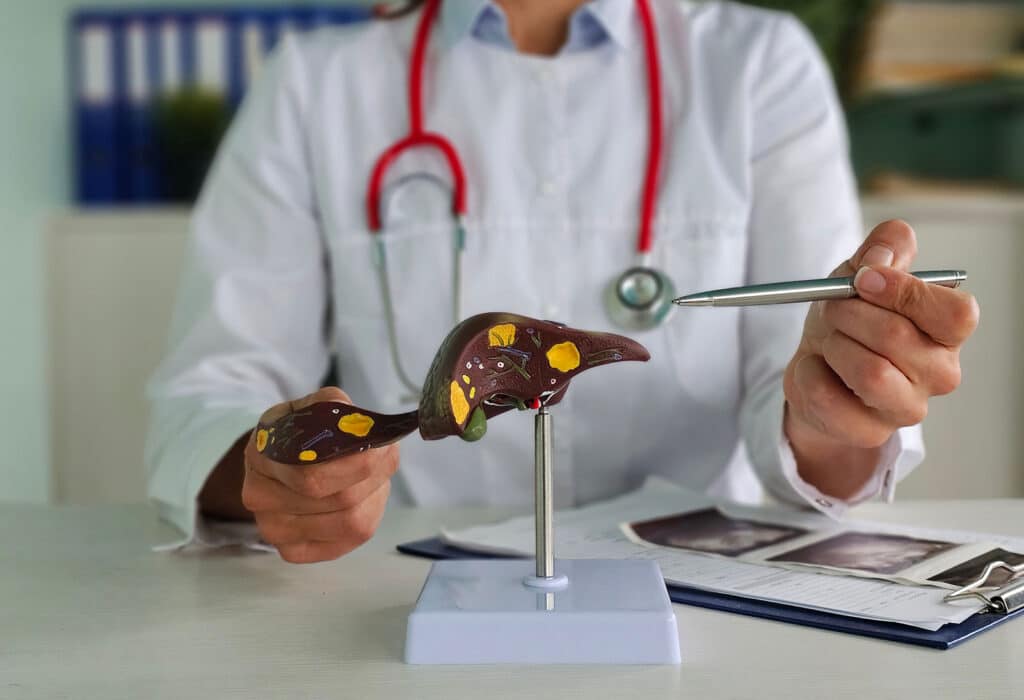Alcoholism affects your body in many ways, but one of the most dangerous is how it can damage your liver. Your liver is an important organ that serves many functions such as removing toxins from your bloodstream, producing bile that aids in digestion, metabolizing proteins and carbohydrates that your body needs, and producing substances that allow blood to clot. It’s also the only visceral organ capable of regenerating damaged or lost tissue. That is good news if you’ve ever asked yourself, “If I quit drinking will my liver heal?” Excessive alcohol use can cause severe liver damage and liver disease, but your liver should recover if you quit drinking. You do need to give it the chance to recover, which will almost certainly mean seeking an alcohol recovery program if you’ve had problems with alcohol use in the past.

Table of Contents
How Alcohol Affects the Liver
The liver is the primary organ responsible for filtering toxins from your blood, making it the first to be affected by alcohol consumption. Moderate alcohol intake, defined as less than 14 units per week (approximately six pints of normal-strength beer or six glasses of wine), is unlikely to cause significant liver damage. However, heavy alcohol use or binge drinking can lead to a cascade of liver-related issues over time.
Stages of Alcohol-Related Liver Damage
1. Fatty Liver Disease
Excess alcohol intake can lead to fatty liver disease, where fat deposits accumulate in the liver. While often reversible with reduced alcohol consumption, this condition can progress to more severe stages like liver cancer, if left unchecked.
2. Inflammation of the Liver
Continued heavy drinking can cause inflammation of the liver, leading to alcoholic hepatitis. Symptoms may include weight loss, fatigue, and abdominal pain. If untreated, this condition can progress to permanent damage.
3. Liver Cirrhosis
In chronic alcohol misuse, the liver attempts to repair itself, forming scar tissue. Over time, this scarring leads to liver cirrhosis, where healthy tissue is replaced with non-functional scar tissue. In the advanced stage, the liver’s ability to function is severely impaired. This can result in complications such as:
- Yellowing of the skin and eyes (bilirubin buildup, known as jaundice).
- Fluid retention and swelling in the abdomen or legs.
- Impaired blood clotting and easy bruising.
- Confusion or sleepiness due to toxins accumulating in the bloodstream.

Other Effects of Alcohol on Liver and Health
- Blood pressure issues may arise due to liver dysfunction.
- Impaired liver function can affect nutrient processing, emphasizing the importance of a balanced diet for those recovering.
- Blood tests are often used to diagnose liver damage, measuring liver enzymes and bilirubin levels to assess the extent of harm.
Preventing Alcohol-Related Liver Disease
Limiting alcohol consumption and avoiding heavy drinking are crucial steps in preventing alcohol-related liver disease. For those already experiencing liver damage, early intervention and reducing the amount of alcohol consumed can slow progression and improve outcomes. Severe cases of cirrhosis are irreversible and may ultimately require a liver transplant.
Understanding the effects of alcohol on the liver is key to making informed choices and maintaining long-term health.
Can the Liver Heal After Quitting Alcohol?
If you drink more than the recommended limit of alcohol every week, you almost certainly have a fatty liver and possibly some scarring. Fortunately, the liver is very good at repairing itself. For people with fatty liver or mild scarring, not drinking alcohol for only seven days is enough for their livers to recover. After several months of not drinking, the liver is completely healed and liver function is back to normal.
Heavy drinkers and those who have struggled with alcohol use disorder for years have a longer recovery ahead of them. Giving up drinking completely will reduce the chances of liver failure and death in a heavy drinker, but they will almost certainly experience alcohol withdrawal. In its mildest forms, alcohol withdrawal causes symptoms such as shaking, sweating, anxiety, and nausea. At its worst, it can cause hallucinations, delirium, seizures, and even death. This is why giving up alcohol “cold turkey” is never recommended especially once someone has become physically dependent on it.
If you’ve been a heavy drinker for several years, complete liver recovery may not be possible. However, seeking treatment and getting sober will prevent any further liver damage. In other words, it’s almost never too late to seek help for alcoholism.

Steps to Support Liver Health After Quitting Drinking
The most critical step in recovering from liver disease or damage is to stop drinking alcohol entirely. For those who have consumed alcohol heavily or over a long period, quitting may result in severe withdrawal symptoms, making it essential to seek professional medical advice and consider an alcohol recovery program. Medically-assisted detox ensures the withdrawal symptoms are managed under close supervision, minimizing risks during this challenging process.
Short-Term Recovery and Liver Healing
While conditions like liver scarring or fibrosis are irreversible, a fatty liver can begin to heal within weeks after alcohol cessation. During this short-term recovery period, liver cells start regenerating, helping restore liver function and prevent further damage. Supporting this process involves:
1. Eating Nutrient-Rich Foods
Focus on foods that support liver health, such as:
- Leafy greens and berries for antioxidants.
- Salmon and other omega-3-rich foods to reduce inflammation.
- Whole grains to help regulate cholesterol levels.
2. Staying Hydrated
Adequate hydration reduces stress on the liver and helps restore proper intestinal function, which is crucial for nutrient absorption and detoxification.
3. Supplements and Enzymes
Consider doctor-recommended supplements to support liver health. These may include vitamins or compounds that boost liver enzymes, aiding in the recovery of liver function.
Long-Term Recovery and Lifestyle Changes
To sustain liver health over the long term a healthy lifestyle helps:
- Regular Exercise: Physical activity improves energy levels, boosts the immune system, and supports overall liver function. Always consult your doctor before starting a new exercise program.
- Avoid Toxins: Stay away from harmful substances like aerosol sprays, illicit drugs, and overuse of medications like acetaminophen, which can strain the liver.
- Follow Medical Guidance: For severe cases, such as cirrhosis, discuss treatment options with your doctor. In extreme situations, a liver transplant may be necessary.
Taking these steps ensures your liver has the best chance of recovery, enabling a healthier and more vibrant future. Always consult a healthcare provider for personalized recommendations and support.

How Illinois Recovery Center Can Help
Excessive alcohol consumption can lead to serious health problems, including liver damage. Fortunately, much of this damage can be repaired if intervention occurs in the early stages. Recovery begins with stopping alcohol abuse, and Illinois Recovery Center is here to support you every step of the way.
Our drug and alcohol addiction treatment center is staffed by a team of experts who specialize in creating personalized treatment plans tailored to each individual. Whether you or a loved one is struggling with alcohol addiction, our evidence-based programs are designed to promote lasting recovery and improved health.
If you are concerned about the effects of alcohol abuse on your liver or your overall well-being, contact Illinois Recovery Center today. Learn more about our comprehensive alcohol recovery programs and take the first step toward a healthier future.



